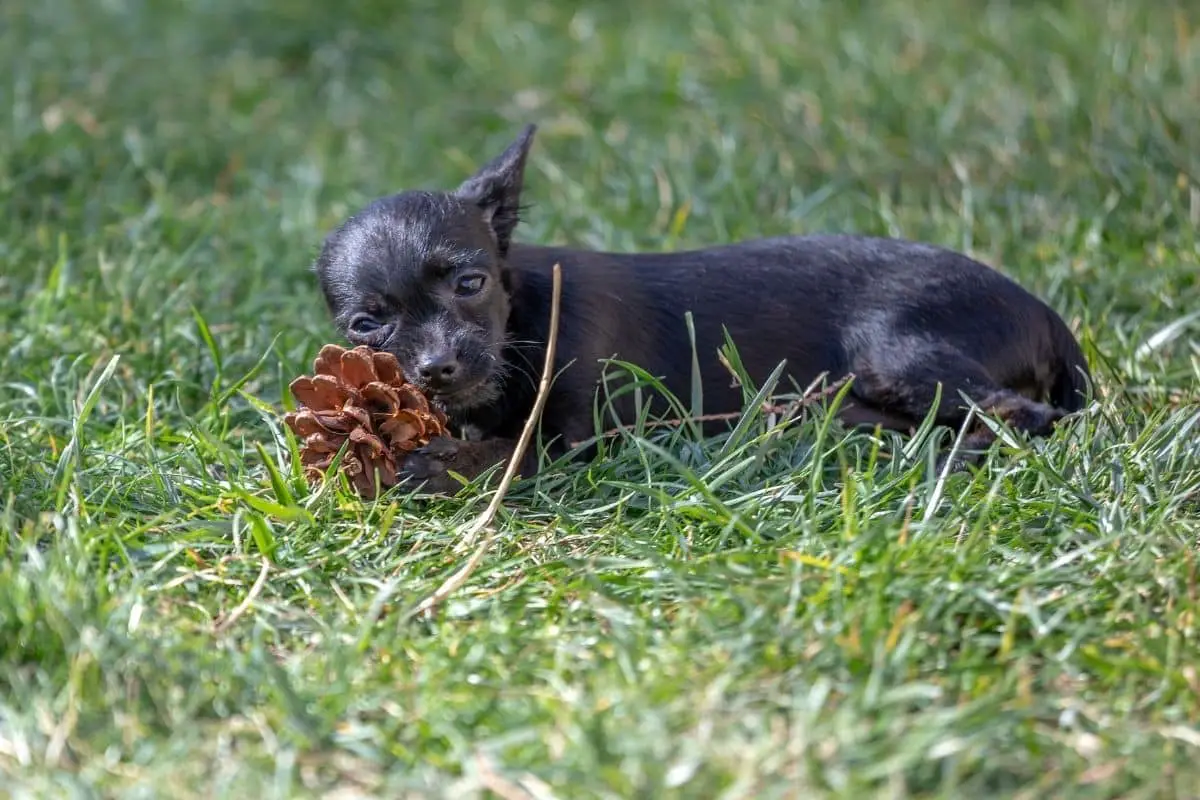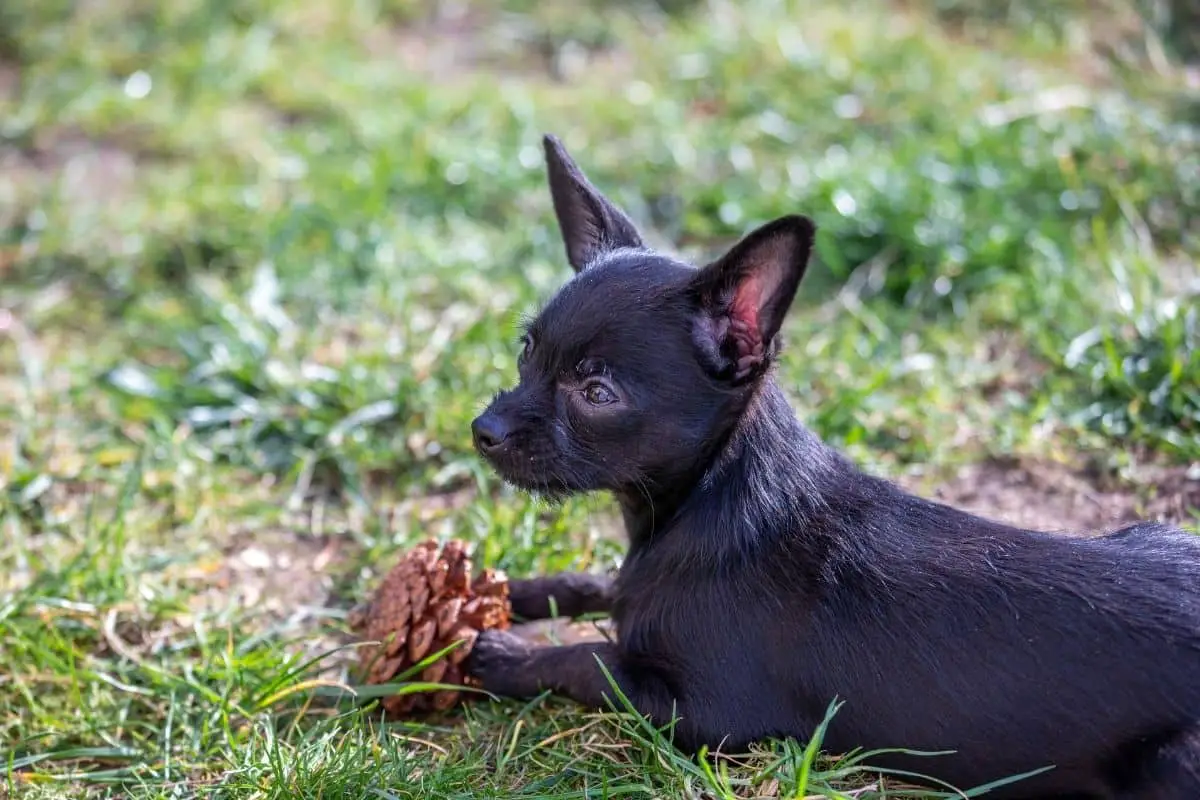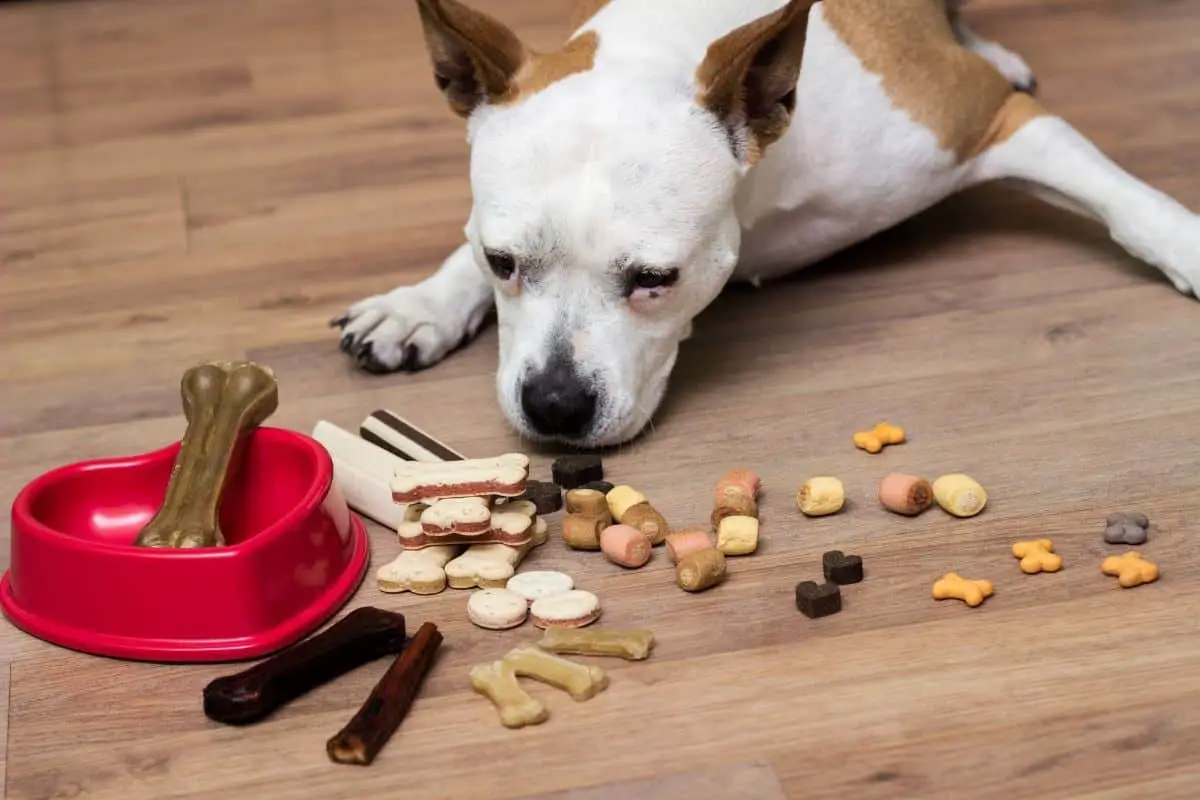We all love our dogs. They mean the world to us, and we want to take good care of them. Just like you, they deserve a healthy diet that includes healthy meats, veggies and wholesome treats.
When we think of food, pine cones probably don’t come to mind. Chances are, if you have a dog and take them on walks anywhere there are pine trees, your dog has brought you one.
Sure, you might be happy to receive the gift, but what if you notice that it looks like it’s been chewed? Is it okay for dogs to chew pine cones, or are they harmful to your dog’s health?

It’s a question anyone acquainted with pine cones and dogs have thought of, and today you will get your answer!
Here, we are going to go through everything you should know about your dog and pine cones.
Hopefully, by the end of this post, you will know a little more on the topic and put your worries to rest. Ready to get into it?
What Are Pine Cones
To start off, we need to understand what a pine cone is. A pine cone, or conifer cone, comes from gymnosperm plants. They are the seed-bearing organ of the tree. Surprisingly, pine cones are actually a type of fruit.
They look like the flower buds of a plant (though not as pretty). It contains seeds which are used to reproduce.
Pine cones are hard, brown, and typically oval. They look like they are covered in scales, but they gradually open up as time goes by.
In the winter, pine cones are usually closed up, in order to protect the seeds inside. Cones typically drop in the fall and winter, which is why they are popular Christmas decorations. When the weather warms up enough, and the seeds are mature, the cones will be able to grow into trees.
Are Pine Cones Toxic?
Pine cones themselves are not poisonous or toxic, but that doesn’t mean it’s a good idea for your pet to chew on them.
There are a number of potential dangers that are associated with eating pine cones, even though they are not poisonous or toxic. We will go through each of them below to understand why.
The Sap
While the sap might not be a problem for all dogs, there will be dogs who will have an allergic reaction to pine sap. Pine sap is a sticky, yellowish liquid found in the center of the cone.
The glands that produce sap are located on the outside of the cone, so when you bite into any part of the cone, you could potentially ingest some sap.
If you’re worried about your dog having these allergies, then it would be best to avoid putting anything in their mouth at all times.
Again, this won’t be an issue for a lot of dogs, but if your furry friend gets pine sap in their mouths, and they are allergic, it could be very problematic. It’s a good idea to simply avoid pine cones getting in your dog’s mouth altogether.
If your dog has gotten their paws on a pine cone and is suffering from an allergic reaction, get in touch with the vet immediately. You never know how severe the reaction could be, and it is better to be well-equipped to deal with it. Getting help is the best thing you can do for your animal.
Pine Oil
Pine oil is another reason why dogs shouldn’t eat pine cones. Like with the sap, some dogs can have bad allergic reactions to pine oil. If your dog ingests pine oil, it can have a detrimental effect on their stomach.
If you are concerned that your dog has eaten a pine cone, and they are exhibiting signs of discomfort, you should get in touch with your vet. Do not try to induce vomiting, because that could make it worse. It’s best to wait for professional help so that you do not agitate the symptoms.
Fertilizers and Pesticides
Many pine trees, and coniferous trees in general, could have fertilizer or pesticides on them. While these things will help the tree, they are not good for your dog to ingest. These chemicals could cause serious health problems.
It’s important to take precautions if you think your dog may have ingested any pine cones – especially ones that contain fertilizers or pesticides.
Even if your dog isn’t ill, it’s still critical that they don’t get sick due to consuming those toxins.
If you think your dog has ingested pesticides, get in touch with your vet as soon as possible. Pesticide poisoning can have severe long-term consequences and can even lead to death in serious cases.
They Are Sharp
A simple reason you do not want your dog to eat pine cones is because of the shark scales that cover the cone. These scales can harm your dog if they accidentally swallow them.

These shark scale type pine cones can be pretty common around many parts of North America. They can be fairly large, and they often grow in groups, making them easier for a curious pooch to grab onto.
Not only can these scales hurt your dog if they accidentally swallow them, but they can also result in internal bleeding. The scales aren’t actually toxic, but they can definitely be dangerous for your pet. Internal bleeding isn’t the only problem. Your dog could accidentally cut their mouth or paws.
So, while it might seem like a fun activity for some dogs, eating pine cones is not something you should encourage under any circumstances. If you do decide to give your dog pine cones as treats, make sure you’re doing it carefully.
Be aware of what kind of pine cones you have, and ensure that you’re not giving them to your pet without supervision. Overall, however, these should be avoided for the sake of your dog.
May Cause Vomiting
Ingesting pine cones is also likely to cause many dogs to vomit. This doesn’t mean that your dog won’t enjoy the treat, though. Many dogs find that pine cones taste quite delicious, which is part of the appeal for many of them.
However, if you’re worried about your dog vomiting after eating pine cones, then you’ll need to take steps to prevent this from happening.
Unfortunately, the potential risks do not outweigh the rewards. Dogs frequently will eat things we know can harm them (for example, chocolate), and they will enjoy it at the time!
Just because your dogs seem to enjoy pine cones, doesn’t mean that they should be treated as a healthy snack.
Blocks Intestines
In serious instances when pine cones have been ingested, your dog’s intestines could get blocked. In many cases, this happens when your dog eats large amounts of pine cones over a short period of time.
It’s really important to monitor your dog closely after they’ve eaten pine cones, and pay attention to how they feel.
If your dog shows signs of abdominal pain or diarrhea, go to your veterinarian immediately. There is no way to quickly tell how much damage has occurred inside your dog’s stomach before he gets checked out by the vet.
Once your vet knows what’s going on, you can help him figure out the best course of action to fix the problem.
If your dog ate too many pine cones all at once, you should talk to your vet about having your dog undergo an X-ray to see if there are any blockages in his digestive tract.
In addition, your vet will probably recommend that your dog receive fluids intravenously until the blockage is resolved.
While this sounds like an extreme case, it’s actually fairly common in pets. If you are unable to solve the blockage quickly, surgery may be required. If this happens, it could be very expensive. The experience is unpleasant for both owner and pet.
Some Other Problems
There may be other concerns associated with eating pine cones. For example, the pine needles themselves could be an issue. If your dog has eaten a pine cone, there will be pine needles all over the ground. Your dog could accidentally chew and swallow some of these needles.
If this happens, your dog’s mouth and stomach could be punctured. Although the damage is unlikely to be serious, in rare cases it could potentially cause internal bleeding. They may also ingest bacteria from the needles and develop an infection.
Symptoms to Look Out For
We aren’t superhuman – there will always be times that our dogs have eaten something without us knowing.
When this happens, you will need to be able to spot the signs in your animal. Below are a few things that you should look out for:
- Loss of appetite
- Breathing issues
- Symptoms of an allergic reaction
- Vomiting
Your dog may also seem lethargic and generally unlike themselves. If this is the case, you should contact your vet or get in touch with a helpline. Either one will be able to give you advice on what you should do next.
Alternative Treats For Your Dog
There are so many treats that you could give your dog instead of pine cones.

Here are some alternative you could test out on your dog:
- Chewy Bones – Chewy bones are great for dogs who love chewing. These tasty snacks are made using real beef bone meal. You can buy them at most pet stores.
- Dog Biscuits – Biscuits are another option. As long as you make sure that they don’t contain wheat flour, you shouldn’t run into any problems. Some biscuits even include beef bone meal to add extra flavor.
- Treat Bars – These are also good alternatives to pine cones. Tasty treat bars are made with animal ingredients such as chicken, turkey, pork, lamb, duck and beef. With these delicious treats, your dog won’t even miss pine cones.
- Oatmeal – Not only does oatmeal provide your dog with essential nutrients, but it also tastes quite good to them. A bowl full of hot oats could become a favorite part of your dog’s diet.
You can also give your dog more natural treats like boiled chicken, liver and eggs. Just make sure to cook them well enough not to risk food poisoning. Also remember that raw meats could pose a threat to your pet’s health.
While dogs are usually hardier than us humans, we still shouldn’t risk their lives. Uncooked meats can carry diseases (especially work). Because of this, if you’re planning on giving your dog meat, it’s often a good idea to cook it first.
Your dog might even enjoy some veggies as treats! However, you shouldn’t feed your dog too many vegetables, since they should primarily eat meat.
Be careful of which veggies you give your dogs, too, because some of them are harmful to them!
Always steer clear of onions and garlic, and limit your dog’s intake of things like broccoli. Like anything, if you give your dog too much of a good thing, it can end up being bad.
What You Can do to Stop Your Dog From Eating Pine Cones
As previously mentioned, we aren’t superhuman. Your dog can be sneaky, and will eat a lot of things behind your bag. When you are able to stop them, it’s great, but not always a possibility. If you are worried about your dog eating pine comes when you are out on walks, there are a few things you can try in order to alleviate the issue:
- Take a toy with you – this will distract them from the pine cones
- Train your dog – training your dog properly is an important part of ownership. Teaching your dog the “leave it” command will serve both you and your best friend.
- Use treats – implement treats into your routine. If you have been training your dog to leave pine cones alone, always be sure to reward them. You can also use treats as a distraction, but you need to remember that many treats are basically empty calories and aren’t always good for your dog in large quantities.
Final Thoughts
To conclude, pine cones themselves are not toxic or poisonous to your dog, However, they can cause problems if an entire bunch gets stuck in one place. This can lead to choking, so it’s better to avoid feeding your dog pine cones altogether.
The same goes for other foods and treats. Make sure that you watch what your dog eats and never give them dangerous items.
If you are worried about your dog that has recently eaten or chewed on a pine cone, keep an eye out for any of the symptoms mentioned in the above sections. If you notice any of these, get in touch with your vet or a helpline to find out what you need to do.
- What Dog Breeds Have Pink Skin? - March 24, 2023
- What Are the Most Inspiring Dog Breeding Quotes? - March 20, 2023
- Can Pheromone Spray Help Improve Dog Breeding Results? - March 19, 2023








